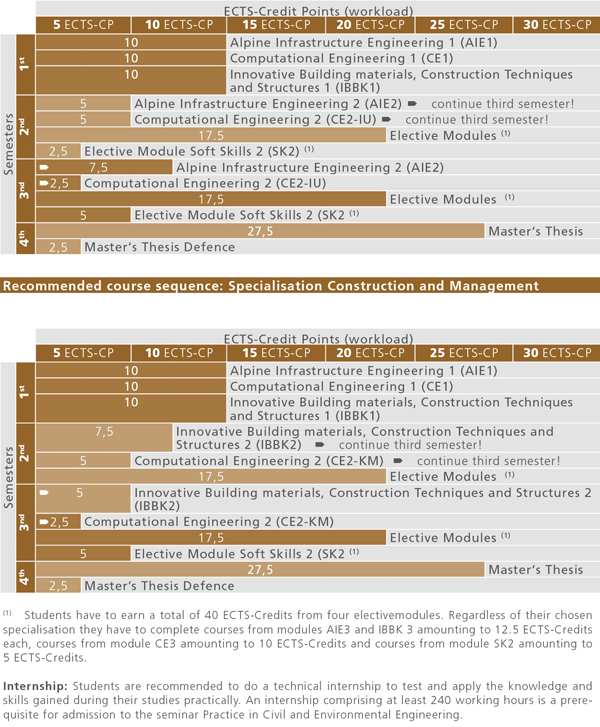Master's Programme Civil and Enviromental Engineering
Curriculum (2008W)
As of winter semester 2014/2015 this programme is no longer open to new entrants.
Diplom-Ingenieurin/Diplom-Ingenieur (Dipl.-Ing. or DI)
Duration/ ECTS-Credits
4 semesters / 120 ECTS-Credits
Mode of Study
Full-Time
Admission Requirements
Relevant bachelor's degree or equivalent
Faculty
Faculty of Engineering Sciences
Qualification Level
Master (Second Cycle)
Study Code
UC 066 468
* Information on the Curriculum (2008W)
- University of Innsbruck Bulltetin June 2014, Issue 36, No. 543 (Withdrawal of degree programmes)
- University of Innsbruck Bulletin May 4 2007, Issue 50, No. 224
- English version of the Curriculum
Requirements
Relevant bachelor's degrees at the University of Innsbruck:
Bachelor's Programme Civil and Enviromental Engineering
Criteria for the determination of equivalence:
Admission to the master's degree programme may also be possible if a student has completed a bachelor's degree in a relevant related field. As part of the determination of equivalence, the following core areas of the completed bachelor's degree programme will be assessed:
- 25 ECTS-Credits Core Area: Mathematics, Geometry and Informatics
- 15 ECTS-Credits Core Area: Mechanics
- 22 ECTS-Credits Core Area: Strength of Materials and Structural Analysis
- 22 ECTS-Credits Core Area: Concrete and Masonry Construction, Structural Steelwork andWood
Building Design and Construction - 22 ECTS-Credits Core Area: Geotechnical Engineering and Hydraulic Engineering
- 20 ECTS-Credits Core Area: Building Construction and Building Physics and Building Materials
- 20 ECTS-Credits Core Area: Environmental Engineering and Transportation Engineering
- 12 ECTS-Credits Core Area: Construction Management and Economics
- 5 ECTS-Credits Core Area: Surveying
In the event that equivalence has been established in principle but with certain qualifications missing for full equivalence, supplemental examinations may be required. These examinations must be completed during the master degree programme.
Information (in German only)
- Information about the Master's Programme
- Equivalence List
- Examination Dates
- Guidelines for electronic submission and publication of academic theses and Instruction
Recommended Course Sequence: Specialisation Infrastructure and Environment
The exemplary course sequence given below is recommended for full-time students beginning their study programme in the winter semester. The table shows one possible course sequence for the bachelor's programme and is not compulsory. Delays resulting from repeated examinations are not taken into account.
The standard duration of the study programme is 4 semesters or 120 ECTS-Credits, whereby according to the Universities Act of 2002, a workload of 1,500 (real) hours per academic year must be fulfilled, corresponding to 60 ECTS-Credits (one ECTS-Credit is equivalent to a workload of 25 hours).
10.0 ECTS-Credits: Alpine Infrastructure Engineering 1 (AIE1)
10.0 ECTS-Credits: Computational Engineering 1 (CE1)
10.0 ECTS-Credits: Innovative Building materials, Construction Techniques and Structures 1 (IBBK1)
5.0 ECTS-Credits: Alpine Infrastructure Engineering 2 (AIE2) › continue third semester!
5.0 ECTS-Credits: Computational Engineering 2 (CE2-IU) › continue third semester!
17.5 ECTS-Credits: Elective Modules (1)
2.5 ECTS-Credits: Elective Module Soft Skills 2 (SK2) (1)
› 7.5 ECTS-Credits: Alpine Infrastructure Engineering 2 (AIE2)
› 2.5 ECTS-Credits: Computational Engineering 2 (CE2-IU)
17.5 ECTS-Credits: Elective Modules(1)
2.5 ECTS-Credits: Elective Module Soft Skills 2 (SK2)(1)
27.5 ECTS-Credits: Master‘s Thesis
2.5 ECTS-Credits: Master‘s Thesis Defence
Recommended course sequence: Specialisation Construction and Management
The course sequence given below is recommended for full-time students beginning their study programme in the winter semester. Delays resulting from repeated examinations are not taken in to account.
The standard duration of the study programme is 4 semesters or 120 ECTS-Credits, whereby according to the Universities Act of 2002, a workload of 1,500 (real) hours per academic year must be fulfilled, corresponding to 60 ECTS-Credits (one ECTS-Credit is equivalent to a workload of 25 hours).
10.0 ECTS-Credits: Alpine Infrastructure Engineering 1 (AIE1)
10.0 ECTS-Credits: Computational Engineering 1 (CE1)
10.0 ECTS-Credits: Innovative Building materials, Construction Techniques and Structures 1 (IBBK1)
7.5 ECTS-Credits: Innovative Building materials, Construction Techniques and Structures 2 (IBBK2)
› continue third semester!
5.0 ECTS-Credits: Computational Engineering 2 (CE2-KM) › continue third semester!
17.5 ECTS-Credits: Elective Modules(1)
› 5.0 ECTS-AP: Innovative Building materials, Construction Techniques and Structures 2 (IBBK2)
› 2.5 ECTS-AP: Computational Engineering 2 (CE2-KM)
17.5 ECTS-AP: Elective Modules (1)
5.0 ECTS-AP: Elective Modules Soft Skills 2 (SK2)(1)
27.5 ECTS-Credits: Master‘s Thesis
2.5 ECTS-Credits: Master’s Thesis Defence
(1) Students have to earn a total of 40 ECTS-Credits from four electivemodules. Regardless of their chosen specialisation they have to complete courses from modules AIE3 and IBBK 3 amounting to 12.5 ECTS-Credits each, courses from module CE3 amounting to 10 ECTS-Credits and courses from module SK2 amounting to 5 ECTS-Credits.
Internship: Students are recommended to do a technical internship to test and apply the knowledge and skills gained during their studies practically. An internship comprising at least 240 working hours is a prerequisite for admission to the seminar Practice in Civil and Environmental Engineering.

Forms (in German only)
- Application for the Master's Thesis/Supplementary Sheet 1
- To block a thesis
- Examination Records
- Recognition of exams
- Declaration of the chosen specialisation
Contact and Information
Examination Office
Standort Technikerstraße 17

Associate Dean of Studies
assoz. Prof. Dipl.-Ing. Dr. Manfred Kleidorfer
(Recognitions)
Dean of Studies
Univ.-Prof. Mag. Dr. Hans-Peter Schröcker
